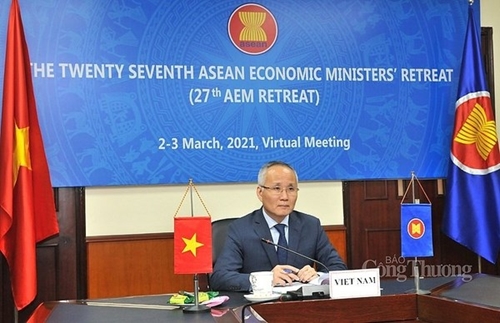The initiatives and priorities have been built with three main orientations - recovery, digitalization, and sustainability - with a focus on such important fields as trade facilitation, tourism, energy, information technology, minerals, and sustainable development.
    |
 |
|
Deputy Minister of Industry and Trade Tran Quoc Khanh attends the 27th ASEAN Economic Ministers’ Retreat. |
Of note, several initiatives inherit cooperation contents from 2020 when Vietnam assumed the role of ASEAN Chair.
In the context of the COVID-19 pandemic continuing to have a serious impact, delegates discussed ASEAN’s efforts to recover economies so as to not only fight the pandemic but also boost economic development, particularly the expansion of the ASEAN List of Essential Goods.
In particular, the retreat also reached consensus on 2021 agenda priorities in economy with 68 different contents, such as trade in goods, trade in services, investment, intellectual property, e-commerce, and consumer protection, among others.
At the event, Khanh expressed his support for Brunei’s initiatives during its ASEAN Chairmanship Year 2021, and affirmed that Vietnam will continue cooperating closely with other ASEAN countries to realise the common targets of the ASEAN Economic Community.
Vietnam also shared its experience and efforts to control the pandemic and ensure economic development while implementing its commitments within ASEAN and the ASEAN Plus frameworks.
Together with discussions on intra-bloc economic cooperation, the participants also exchanged views on extra-bloc economic cooperation, such as reviewing the implementation of the ASEAN-India Trade in Goods Agreement (AITIGA) and collaboration between ASEAN and the EU.
They said their countries are exerting every effort to soon ratify the Regional Comprehensive Economic Partnership (RCEP) agreement to facilitate post-pandemic recovery.
Within the framework of the retreat, the participants held a consultation with the ASEAN Business Advisory Council to make recommendations on health care and addressing non-tariff measures, and intensifying public-private partnerships (PPPs) in ASEAN and between the grouping and its partners.
Source: VNA